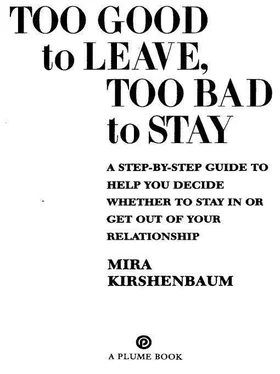Kirshenbaum, Mira - Too Good to Leave, Too Bad to Stay
Здесь есть возможность читать онлайн «Kirshenbaum, Mira - Too Good to Leave, Too Bad to Stay» весь текст электронной книги совершенно бесплатно (целиком полную версию без сокращений). В некоторых случаях можно слушать аудио, скачать через торрент в формате fb2 и присутствует краткое содержание. Жанр: Психология. Описание произведения, (предисловие) а так же отзывы посетителей доступны на портале библиотеки ЛибКат.
- Название:Too Good to Leave, Too Bad to Stay
- Автор:
- Жанр:
- Год:неизвестен
- ISBN:нет данных
- Рейтинг книги:3 / 5. Голосов: 1
-
Избранное:Добавить в избранное
- Отзывы:
-
Ваша оценка:
- 60
- 1
- 2
- 3
- 4
- 5
Too Good to Leave, Too Bad to Stay: краткое содержание, описание и аннотация
Предлагаем к чтению аннотацию, описание, краткое содержание или предисловие (зависит от того, что написал сам автор книги «Too Good to Leave, Too Bad to Stay»). Если вы не нашли необходимую информацию о книге — напишите в комментариях, мы постараемся отыскать её.
Too Good to Leave, Too Bad to Stay — читать онлайн бесплатно полную книгу (весь текст) целиком
Ниже представлен текст книги, разбитый по страницам. Система сохранения места последней прочитанной страницы, позволяет с удобством читать онлайн бесплатно книгу «Too Good to Leave, Too Bad to Stay», без необходимости каждый раз заново искать на чём Вы остановились. Поставьте закладку, и сможете в любой момент перейти на страницу, на которой закончили чтение.
Интервал:
Закладка:
It’s also something, like simultaneous orgasms, that’s a lot easier in theory than in practice. What you have to watch out for is when negotiating solutions together is virtually impossible. Here’s what makes it impossible:
You can’t negotiate if you can’t listen to each other or
understand what the other is saying.
One reason you and your partner might not be able to listen to each other is that you feel furious and deprived. How can you listen to what someone wants or what they need in order to give you what you need, if you feel like strangling them because you have so little or because they’ve taken so much from you?
Another reason you can’t listen is that your partner is a bad communicator. One guy I worked with is so boring and so long-winded and so overintellectual when he opens his mouth, you want to run screaming from the room. Someone else was so confused and diffuse and unfocused that you’d never know what in the world she was talking about. It doesn’t have to be this bad, either. It might simply be that no matter how long your partner talks you never figure out exactly what he’s asking you to do.
Another reason you can’t listen is that you’re exhausted and overwhelmed. It may be that you’ve been listening to people tell you what they want all day—customers, colleagues, bosses. Then the kids are babbling on and on. When your partner opens his mouth you’re already on overload.
You can’t negotiate if you’re scared to death
you’re going to lose.
One reason you would be afraid of losing is that he’s a dirty fighter. So when you have to negotiate something he’ll call you names, he’ll throw your past in your face, he’ll threaten you, he’ll make it seem as though it’s costing him the agony of death to give up the slightest bit, he’ll lie about how little money he has, he’ll start screaming—you get the picture. He’s just got more weapons than you have, and he’s more willing to use them.
Another reason you would be afraid of losing is that your partner’s limited. She might simply have nothing to give. If she’s tired all the time, then you can’t have more sex and you can’t go out more often and you can’t talk about all the things you want to talk about and you can’t do any of the things exhaustion prevents people from doing. Or he might simply be stupid. Stupid people can’t “get” the idea of negotiating solutions, where you try to find new and better ways for the two of you to satisfy both of your needs. All they can think of is that you want X and they don’t have X in that moment and in that way, and so negotiation is impossible.
You can’t negotiate if you’re afraid of being attacked. You
have to feel safe putting your needs out there.
One reason you would be afraid of being attacked is that your partner’s what I call a “historian.” Everything you bring up hooks into the past. If you want to spend some money now it hooks into ways you’ve spent money foolishly in the past or ways you’ve been stingy yourself in the past. If you want to have sex more often, it hooks into all the times you said no to sex in the past or all the sexual problems there’ve ever been between you in the past.
Another reason you’d be afraid of being attacked is that you feel criticized. Every need you bring up is an occasion for your partner to tell you what’s wrong with you for having that need. What! You want him to help around the house more? That just means that you’re small-minded and obsessive. What! You want her to stop criticizing you so much? That just means you’re weak and defensive and unwilling to grow. And if people like this don’t criticize you for having your need, they criticize you for the way you bring up your need, so that you end up feeling like someone who has terrible timing or who’s terribly insensitive.
You can’t negotiate if you’re afraid of conflict and struggle.
One reason you’d be afraid of this is that every negotiation in the past has ended in disaster. If your idea of negotiation is a calm discussion but for your partner it’s an opportunity to get passionate, then you’ll quickly spiral into a huge disappointing fight every time one of you brings up a need. Sometimes two people in a relationship are simply both hard bargainers with a total win-lose approach to every negotiation, and so every negotiation is a disaster because no one wants to lose.
Another reason you’d be afraid of conflict and struggle is that, without getting too technical about it, your partner’s a nut. The stress of negotiation throws her into a deep depression every time. Or the slightest impasse makes him feel he’s got to threaten to leave the relationship.
Another reason you’d be afraid of conflict and struggle is that there are these stumbling blocks lurking in your relationship that you bang into two minutes into any negotiation. For example, the two of you don’t have a lot of money, certainly not compared to your bills and expenses, and so even a discussion about how you can have more fresh vegetables in the house bangs into this where’s-the-moneyP stumbling block. Or it could be there’s an ongoing fight between you about one of you being too strict and the other being too permissive when it comes to the kids, and even a simple statement of your need to pay more of the bills more on time immediately falls into this strict versus permissive battle.
All these realities I’ve listed are things that turn negotiating needs from the hassle they are for everybody to the ordeal they are for some people. And if these realities are so powerful and the ordeal they create is so terrible, then this is going to make it a lot less likely that you’ll be able to get your needs met.
3. “You Never Do What You Say You’re Going to Do”
If you think the negotiation from hell is a problem—and it is—watch out for the negotiation that’s “like butter.” Few things make it feel harder to get your needs met than the partner who agrees to what you want but then just doesn’t keep agreements. This is where the issue of trust comes up in relationships. You trust people who do what they say they’re going to do. When they don’t, the relationship is not only a place of fighting and deprivation, it’s a place of betrayal. Not only are you not safely at home there, but you’re in a scary alien world.
It might sound hard to believe, but broken trust can all too often lurk undetected. Let’s say that after a fight—which is what we’re really talking about here when we refer to a negotiation—your partner says he’s going to start taking out the garbage every week without having to be reminded. Sounds good so far. And he does take it out for the first week or so. It’s after that that things fall apart. One week he “forgets” but he was very busy so you let it go. The next week he looks as though he’s going to forget again and so you remind him, and there you are back to where you started.
It’s easy to make excuses in a situation like this but the reality is that trust has been broken. If all we’re talking about is taking out the garbage, it’s no big deal, but a pattern of easily overlooked broken trust is just as deadly to your sense that you can get your needs met as a huge betrayal that slaps you in the face.
There are actually a lot of ways people have of breaking agreements. We just touched on one: forgetting. You’ve got to be careful with this. You and I lead such incredibly busy lives that we desperately feel we’d love to get some leeway. So I’d love to be allowed to forget things without getting in trouble for it. And that means it’s very hard for us to get tough with a partner who’s indulging himself with the very thing we want. We identify with him!
Читать дальшеИнтервал:
Закладка:
Похожие книги на «Too Good to Leave, Too Bad to Stay»
Представляем Вашему вниманию похожие книги на «Too Good to Leave, Too Bad to Stay» списком для выбора. Мы отобрали схожую по названию и смыслу литературу в надежде предоставить читателям больше вариантов отыскать новые, интересные, ещё непрочитанные произведения.
Обсуждение, отзывы о книге «Too Good to Leave, Too Bad to Stay» и просто собственные мнения читателей. Оставьте ваши комментарии, напишите, что Вы думаете о произведении, его смысле или главных героях. Укажите что конкретно понравилось, а что нет, и почему Вы так считаете.












